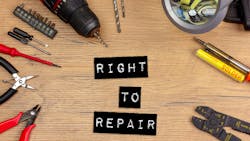Auto OEMs, independent shops forge "landmark" Right-to-Repair deal; ACA stands opposed
The Automotive Service Association (ASA), the Society of Collision Repair Specialists (SCRS) and Alliance for Automotive Innovation (formed in 2020 by the Alliance of Automobile Manufacturers Auto Alliance) and the Association of Global Automakers have affirmed a 2014 national agreement on automotive right-to-repair through a new "landmark agreement" that guarantees “independent repair facilities shall have access to the same diagnostic and repair information that auto manufacturers make available to authorized dealer networks,” according to a release issued by the organizations.
At its heart, Right-to-Repair is about who has access to vehicle diagnostic and repair information needed to perform certain services and warranty work on vehicles. The 2014 Memorandum of Understanding between the parties was based on bringing the Massachusetts Motor Vehicle Owners’ Right to Repair Act to all 50 states. The Massachusetts R2R bill was signed into state law in late 2013. More recently, members of Congress introduced new legislation in February 2023 called the REPAIR Act to expand R2R to products such as smartphones.
Read more: Who has the Right to Repair?
In a letter to Congress, the coalition identifies itself as representing "thousands of auto repair professionals and small businesses in all 50 states as well as the manufacturers producing most vehicles sold in the U.S." They collectively stated: “…independent repairers and automakers are not at odds on automotive data access, but rather in lockstep on this fundamental principle: consumers should have choice when it comes to repair options and the ability to have their vehicle serviced in well-equipped shops by well-trained technicians anytime, anywhere, anyplace.”
The parties noted that "70% of post-warranty automotive work today is handled by the independent repair community" and that the resource OEM1Stop.com was made by auto OEMs to assist auto technicians in finding repair and diagnostic info.
According to the release, highlights of the new automotive right-to-repair agreement include:
- Access to diagnostic and repair information: Independent repair facilities shall continue to have access to the same diagnostic and repair information that auto manufacturers make available to authorized dealer networks. This applies to telematics data needed to diagnose and repair a vehicle if not otherwise available, as well as all vehicle technologies and powertrains, including gasoline, diesel, fuel cell, electric battery,hybrid, and plug-in hybrid electric powertrains.
- Education and training: A pledge to work together on education and training programs so mechanical and collision repair facilities are fully aware of exactly where and how to obtain repair information, including directly through an automaker’s repair website, shared access points (like www.OEM1Stop.com), and through third-party information providers, software and tools.
- Future advancements: As vehicle technologies and the corresponding demands on repairers evolve, the commitment ensures a level playing field and a forum to discuss future repairer needs as they develop.
John Bozzella, president and CEO, Alliance for Automotive Innovation stated:
“Automakers support right to repair, and today’s independent auto repair market is working well with lots of competition. Auto repairers across the U.S. have access to the same repair and diagnostic information provided to auto dealers. It’s not just automakers who say this. It’s the Federal Trade Commission. And with today’s agreement, it’s also the thousands of independent auto repairers and small businesses in all 50 states who together with automakers have once again made this fundamental commitment to customers.”
Scott Benevidez, Automotive Service Association Board Chairman and owner of Mr. B’s Paint & Body Shop Inc. in Albuquerque, New Mexico said:
“ASA has been a steadfast advocate for the right of independent repair shops to vehicle service information since before the 2002 service information agreement it signed with automakers. Since then, the cars Americans rely on have become increasingly sophisticated, and the rate of innovation will only accelerate. The way vehicle issues are diagnosed and repaired evolves in tandem with advancement. ASA is proud to have reached this new agreement with automakers because it ensures ASA members can diagnose and repair their customers’ vehicles without hinderance from telematics nor any other innovation. Most importantly, it maintains a competitive repair market that yields the highest quality safety outcomes at a fair price for drivers.”
Opposition to the deal
Not every stakeholder in the longstanding debate is pleased by the recent development. The Auto Care Alliance (ACA), a group of 1,300 independent automotive service professionals formed in January 2022, asserted that the group "stands opposed to the arrangement and questions why [the ASA] has flipped positions after being vehemently opposed to Right to Repair for over 20 years."
The ACA alleged the ASA "has repeatedly voiced its opposition to Right to Repair, and their reasons for opposing in the past have not been addressed in this new pact between ASA, SCRS, and the Alliance for Automotive Innovation."
The ACA made clear its members do support Right to Repair legislation, but only if all industry partners can be heard. Another sticking point is that in 2003, when aftermarket repairers had "gained ground" in new R2R laws, "ASA entered into an agreement with manufacturers which lacked enforcement," the ACA said. The 2014 MOU signed by the groups involved in this new pact also lacked enforcement mechanics, the ACA alleged.
"This is history repeating itself once again. Their actions are slowing down much-needed legislation and enforcement the automotive industry has needed for decades,” stated Ron Turner, Director for Mid-Atlantic Auto Care Alliance. "There is no evidence that this new agreement involving different parties provides any remedy to the types of issues that have been reported or which parties are now responsible for enforcement.

